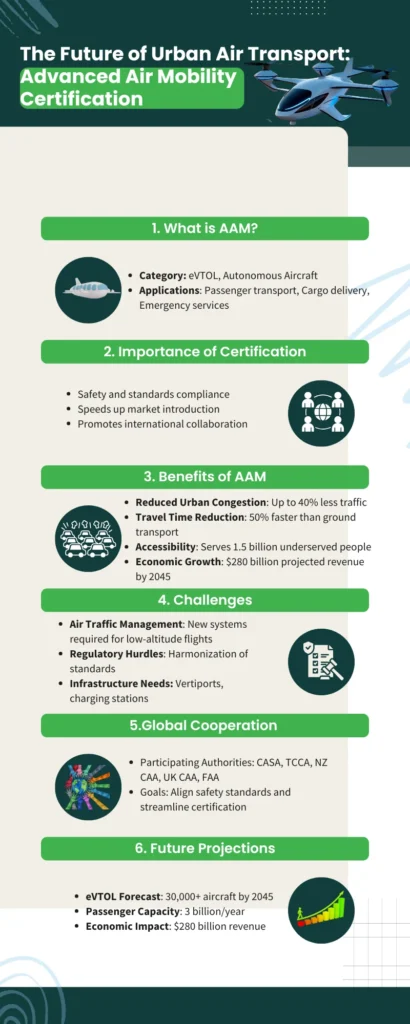Advanced Air Mobility (AAM) is poised to transform urban transport with new aircraft such as electric vertical take-off and landing (eVTOL) vehicles.
To facilitate this transition, aviation authorities from five countries have collaboratively developed a Roadmap for Advanced Air Mobility Aircraft Type Certification. This roadmap aims to streamline the certification process, ensuring safety while enabling innovation.
Significance of Advanced Air Mobility Certification
AAM certification is crucial because it addresses the unique challenges posed by innovative aircraft designs, such as eVTOLs. Currently, these aircraft face complex and inconsistent certification regulations across different countries, which can delay their introduction into the market.
The new roadmap created by the Civil Aviation Safety Authority (CASA) of Australia, Transport Canada Civil Aviation (TCCA), the New Zealand Civil Aviation Authority (NZ CAA), the UK Civil Aviation Authority (UK CAA), and the Federal Aviation Administration (FAA) in the United States focuses on:
- Aligning safety and airworthiness standards internationally.
- Streamlining certification processes to allow manufacturers easier entry into global markets.
- Encouraging regulators to share data and expertise to minimize duplicated efforts.
Why This Roadmap Matters
The roadmap is significant for several reasons:
- Promotes Safety and Innovation: It ensures that while new technologies are encouraged, safety remains a top priority.
- Harmonizes Certification: A performance-based approach helps unify requirements for aircraft across different nations.
- Enables Collaboration: The roadmap fosters coordination among various authorities and global organizations.
- Facilitates Multi-Authority Validation: Joint validation of certifications will speed up approvals.
- Adopts an Incremental Approach: Starting with piloted AAM aircraft allows for gradual progression to fully autonomous models.
- Encourages AAM-Inclusive Agreements: Updating bilateral agreements supports cross-border certification processes.
What Is Advanced Air Mobility (AAM)?
AAM represents a new category of vehicles designed for safe and efficient low-altitude transport, which includes:
- Remotely piloted aircraft
- Fully autonomous vehicles
- Electric vertical take-off and landing (eVTOL) aircraft
These vehicles target various applications such as:
- Passenger transportation in urban environments
- Cargo delivery services
- Emergency public services, including medical evacuations
Benefits of AAM at a Glance
| Benefit | Explanation |
|---|---|
| Reduced Urban Congestion | Bypasses ground traffic with direct aerial routes. |
| Faster Travel | Cuts travel times by flying over obstacles. |
| Better Accessibility | Reaches remote or underserved areas. |
| Environmental Benefits | Electric/hybrid propulsion lowers emissions and noise. |
| Economic Growth | Opens new industries and creates jobs. |
| Enhanced Emergency Services | Rapid access to critical situations. |
| Flexible Infrastructure | Small vertiports fit better in cities than large airports. |

Challenges to Widespread AAM Use
Despite its potential, AAM faces several hurdles:
- Air Traffic Management & Safety: New systems and strict regulations are necessary for managing low-altitude, automated aircraft.
- Regulatory and Certification Hurdles: Developing harmonized standards is complex, especially for autonomous operations.
- Infrastructure Development: Building vertiports and charging stations requires coordination among governments, industry, and city planners.
- Battery and Energy Limits: Current battery technology restricts flight time and payload, necessitating advancements in energy storage.
- Public Acceptance: Building trust in safety, noise, and privacy will require transparency and education efforts.
- Cost and Viability: The high initial costs of vehicles and infrastructure demand innovative solutions to lower prices.
- Environmental Impact: Comprehensive lifecycle assessments from manufacturing to operation are essential.
Real-World Impact: What This Means for Manufacturers and the Industry
Sophie O’Sullivan, Director of Future of Flight at the UK CAA, emphasizes that the roadmap fosters collaboration among aviation authorities, enhancing data sharing on research and safety. Chris Rocheleau, Acting FAA Administrator, underlines the importance of balancing innovation and safety.
This cooperation will lead to:
- Shortened approval times for manufacturers
- Concurrent market access across multiple regions
- Encouraged innovation and growth in the AAM sector
How Industry Leaders Are Advancing AAM

Here’s how some leading companies are progressing in the Advanced Air Mobility sector:
| Company/Project | Focus Area | Progress Highlights |
|---|---|---|
| Joby Aviation (USA) | Electric VTOL air taxi | Nearing FAA certification; working on battery safety. |
| Lilium (Germany) | Electric jet VTOL | Developing vertiport partnerships; overcoming battery challenges. |
| Vertical Aerospace (UK) | Zero-emission air taxis | Collaborating with UK CAA on safety and certification. |
| Ehang (China) | Autonomous drones | Exploring regulations for autonomous flight. |
| NASA’s AAM Campaign | Air traffic management and infrastructure | Coordinating stakeholders for safe urban integration. |
The Growing Market for Urban Air Mobility (UAM)
A recent report from Eve Air Mobility predicts explosive growth in the UAM sector with:
- Over 30,000 eVTOL aircraft expected in operation by 2045
- Transporting up to 3 billion passengers annually
- Generating $280 billion USD in revenue worldwide
As this growth accelerates, the regulatory frameworks must keep pace. The NAA Network’s roadmap provides a robust foundation for managing this rapidly evolving sector responsibly.
Conclusion: A Unified Path Towards the Future of Aviation
The Roadmap for Advanced Air Mobility Aircraft Type Certification represents a collaborative global effort among leading civil aviation authorities. By balancing safety with innovation, this roadmap creates a shared vision for successfully introducing AAM into aviation.
Manufacturers will benefit from quicker certifications and broader market access, while regulators will work cohesively to manage risks and support growth.
Ultimately, this initiative sets a global standard for adapting aviation regulations to emerging technologies, paving the way for a safer, cleaner, and more connected future in urban air transportation.
FAQs About Advanced Air Mobility Certification
- What is Advanced Air Mobility (AAM)?
AAM refers to a category of aircraft designed for efficient, low-altitude transportation using technologies like eVTOL and autonomous systems. - Why is certification important for AAM?
Certification ensures that new aircraft meet safety and regulatory standards, facilitating their introduction into the market while maintaining passenger and public safety. - What are the main challenges in AAM certification?
Challenges include the need for harmonized international regulations, infrastructure development, public acceptance, and the advancement of battery technology. - How does the new Roadmap for AAM certification help manufacturers?
The roadmap streamlines the certification process, allowing manufacturers to access multiple markets simultaneously and reducing approval times. - What role do global aviation authorities play in AAM certification?
Authorities like the FAA and CAA collaborate to align standards, share data, and validate certifications, ensuring a safer and more efficient introduction of AAM technologies globally.
Source: FAA

